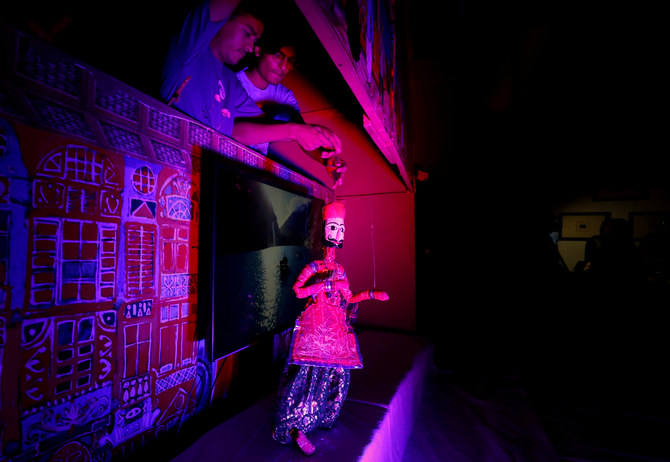KARACHI: In the narrow alleys of a poor neighborhood of the Pakistani city of Karachi, known for drugs, gang wars and low literacy rates, children are learning about peace, love and interfaith tolerance from string puppets.
As the curtains open on stage, a narrator tells the story of “Sindbad the Sailor,” a hero of Middle Eastern origin and his journeys around the world in which he meets people of different faiths, languages and religions — who often do not have much tolerance for one another.
“A man is dying and you guys are talking about castes,” the protagonist puppet rebuked a fellow puppet who did not want to save a drowning marionette because it belonged to a lower caste.
“You should be ashamed calling yourself human beings. Humans save humanity not caste,” Sindbad says.
Writer Nouman Mehmood said the story came to mind when his group was conducting an education awareness campaign in some poor neighborhoods in the city.
They noticed religious and ethnic antagonism in those neighborhoods and decided to create a show to spread a message of peace, tolerance and harmony.
Pakistan, an overwhelmingly Muslim country of more than 200 million people, has seen repeated attacks on churches, Hindu temples and sufi shrines in recent years by hard-line religious groups and Islamist militants.
Conservative religious schools or madrasas are regularly blamed for radicalization but they are often the only education available to millions of poor children, making alternative messages especially important.
“The basic thing is acceptance. You should have enough room to accept others regardless of whether he is a Christian, without considering he is a Hindu, without considering he is a Sikh,” Mehmood said.
Organized by Thespianz Theatre, the show plans to travel to other poor Karachi neighborhoods and provinces after its run in the tough Karachi neighborhood of Lyari.
“There is a message that we should not interfere with others’ religions. We should help each other,” said eighth grade student Adul Rahim Arshad after watching the show.
“If one deceives us, we should not deceive him back. Instead we should help him.”
Puppeteers lead message of tolerance in Pakistan
Puppeteers lead message of tolerance in Pakistan

- Aim to counter religious and ethnic antagonism in poor neighborhoods
- The show plans to travel to other neighborhoods of Karachi
Pakistan deputy PM directs authorities to monitor food prices ahead of Ramadan

- Prices of essential food items surge during holy month of Ramadan due to hoarding, profiteering by traders
- Deputy PM Ishaq Dar directs authorities to prevent artificial price hikes, exploitation of consumers in Ramadan
ISLAMABAD: Pakistan’s Deputy Prime Minister Ishaq Dar on Tuesday directed authorities to monitor prices of essential food items ahead of Ramadan to prevent artificial price hikes and consumers from getting exploited, his office said.
Pakistani increasingly shop for essential food items during the holy month of Ramadan, as millions across the country fast from dawn till sunset. Prices of essential food items surge during the holy month every year as traders often indulge in hoarding and profiteering.
Dar chaired a meeting to review the availability and prices of essential commodities across the country on Tuesday, his office said.
“DPM/FM [foreign minister] directed federal & provincial authorities to continue close monitoring, particularly in view of the approaching month of Ramazan, to prevent any artificial price hike or exploitation of consumers by unscrupulous elements,” Dar’s office said in a statement.
A central moon sighting committee in Pakistan, the Ruet-e-Hilal Committee, determines when Ramadan begins. The Islamic month is expected to start this year after mid-February, around Feb. 17 or Feb. 18.
Pakistan’s government also announces subsidies for the masses during the holy month to lower the prices of essential food items.
In 2024, the Shehbaz Sharif-led government announced a Ramadan package comprising a subsidy of $26.8 million (Rs7.5 billion) to lower the prices of essential items for over 30,96,00,000 families.










